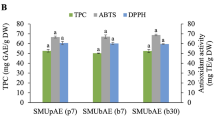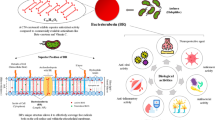Abstract
Orange is among the most widely used products in the global food industry. Waste from this industry could be a good source of raw materials for pectin extraction. The utility of pectin in various fields, in particular pharmaceuticals, has been widely demonstrated. Its stimulate the development of various transformation processes to increase the bioavailability of pectic oligosaccharides and increase their effectiveness. In this study, an agricultural by-product that is widely distributed in Algeria—orange peels—was valorized by extracting the pectin from it. The antiproliferative effect of this pectin on cancer cells was then investigated. The pectin extraction procedure was optimized by trialing different protocols and adjusting several parameters. The optimal extraction procedure involved acid hydrolysis of the orange peels after the removal of essential oils through hydrodistillation. Protocols for modifying pectin chemically (by altering the pH) and physically (via gamma irradiation) were developed. Physicochemical characterization of the resulting modified forms of pectin was carried out by determining the degree of esterification using Fourier-transform infrared spectrometry (FTIR) and the solubility of the pectin in water. The antiproliferative effects of the pectins on laryngeal cancer cells (HEp2) in vitro were assessed using the sulforhodamine B (SRB) cytotoxicity assay. Pectin-induced cell death was observed by fluorescence microscopy after the cells had been stained with acridine orange. The strongest proapoptotic activity towards HEp2 cells was observed after 72 h of contact with chemically modified and irradiated pectin from orange peel. A cancer cell mortality rate of 95% was achieved using this modified pectin, as was a IC50 of 3.18 mg/ml, which was considerably lower than the IC50 for healthy cells. In conclusion, our results show the remarkable proapoptotic effect of chemically modified and irradiated orange peel pectin on a laryngeal cancer cell line, implying that it could be a good candidate for new cancer therapies.



Similar content being viewed by others
References
Almeida EAMS, Facchib SP, Martinsa AF, Nocchic S, Schuquela ITA, Nakamurac CV, Rubiraa AF, Muniza EC (2015) Synthesis and characterization of pectin derivative with antitumor property against Caco-2 colon cancer cells. Carbohydr Polym 115:139–145. https://doi.org/10.1016/j.carbpol.2014.08.085
Attari F, Sepehri H, Delph L, Goliei B (2009) Apoptotic and necrotic efects of pectic acid on rat pituitary GH3/B6 tumor cells. Iran Biomed J 13(4):163–170
Babbar N, Dejonghe W, Gatti M, Sforza S, Kathy E (2015) Pectic oligosaccharides from agricultural by-products: production, characterization and health benefits. Crit Rev Biotechnol. https://doi.org/10.3109/07388551.2014.996732
Conti S, Vexler A, Hagoel L, Kalich-Philosoph L, Corn BW, Honig N, Shtraus N, Meir Y, Ron I, Eliaz I, Lev-Ari S (2018) Modified citrus pectin as a potential sensitizer for radiotherapy in prostate cancer. Cancer Ther 17(4):1225–1234. https://doi.org/10.1177/1534735418790382
Cho KS, Lee EH, Choi JS, Joo CK (1999) Reactive oxygen species-induced apoptosis and necrosis in bovine corneal endothelial cells. IOVS 40(5):911–919
Delphi L, Sepehri H, Khorramizadeh MR, Mansoori F (2015) Pectic-oligoshaccharides from apples induce apoptosis and cell cycle arrest in MDA-MB-231 cells, a model of human breast cancer. Asian Pac J Cancer Prev 16(13):5265–5271. https://doi.org/10.7314/APJCP.2015.16.13.5265
Dongowski G, Lorenz A, Proll J (2002) The degree of methylation influences the degradation of pectin in the intestinal tract of rats and in vitro. Nutr J 132:1935–1944. https://doi.org/10.1093/jn/132.7.1935
Dumic J, Dabelic S, Flogel M (2006) Galectin-3: an open-ended story. Biochim Biophys 1760:616–635. https://doi.org/10.1016/j.bbagen.2005.12.020
El-Batal AI, Abou Zaid OAR, Noaman E, Ismail ES (2012) In vivo and in vitro antitumor activity of modified citrus pectin in combination with selenium nanoparticles against Ehrlich carcinoma cells. Pharmasc Health Care J 6(2):23–47
Fertonani HCR, Scabio A, Canteri-Schemin MH, Nogueira A, Wosiacki G (2006) Influence of acid concentration on extraction and quality of apple pomace pectin. Semin Cienc Agrar 27(4):599–612. https://doi.org/10.5433/1679-0359.2006v27n4p599
Glinsky V, Raz A (2009) Modified citrus pectin anti-metastatic properties: one bullet, multiple targets. Carbohydr Res 344:1788–1791. https://doi.org/10.1016/j.carres.2008.08.038
Gnanasambandam R, Proctor A (2000) Determination of pectin degree of esterification by diffuse reflectance Fourier transform infrared spectroscopy. Food Chem 68(3):327–332. https://doi.org/10.1016/S0308-8146(99)00191-0
Hartati I, Kurniasari L (2011) Enzymatic extraction of low methoxyl pectin as a potential anti cancer agent from green cincau (Premna oblongifolia Merr.). Prosiding SNST Fakultas Teknik B33–B38
Hossein G, Keshavarz M, Ahmadi S, Naderi N (2013) Synergistic effects of PectaSol-C modified citrus pectin an inhibitor of galectin-3 and paclitaxel on apoptosis of human SKOV-3 ovarian cancer cells. Asian Pac J Cancer Prev 14:7561–7568. https://doi.org/10.7314/APJCP.2013.14.12.7561
Kalapathy U, Proctor A (2001) Effect of acid extraction and alcohol precipitation conditions on the yield and purity of soy hull pectin. Food Chem 73:393–396. https://doi.org/10.1016/S0308-8146(00)00307-1
Kang HJ, Jo C, Kwon JH et al (2006) Antioxidant and cancer cell proliferation inhibition effect of citrus pectin-oligosaccharides prepared by irradiation. J Med Food 9:313–320. https://doi.org/10.1089/jmf.2006.9.313
Keepers YP, Pizao PE, Peters GJ, Van Ark-Otte J, Winograd B, Pinedo M (1991) Comparison of the sulforhodamine B protein and tetrazolium (MTT) assays for in vitro chemosensitivity testing. Eur J Cancer 27(7):897–900. https://doi.org/10.1016/0277-5379(91)90142-Z
Khule NR, Mahale NB, Shelar DS, Rokade MM, Chaudhari SR (2012) Extraction of pectin from citrus fruit peel and use as natural binder in paracetamol tablet. Pharm Lett 4(2):558–564
Leclere L, Fransolet M, Cote F, Cambier P, Arnould T, Van Cutsem P, Michiels C (2015) Heat-modified citrus pectin induces apoptosis-like cell death and autophagy in HepG2 and A549 cancer cells. PLoS ONE 10(3):e0115831. https://doi.org/10.1371/journal.pone.0115831
Levigne S, Ralet MC, Thibault JF (2002) Characterisation of pectins extracted from fresh sugar beet under different conditions using an experimental design. Carbohydr Polym 49(2):145–153. https://doi.org/10.1016/S0144-8617(01)00314-9
Lopresto CG, Petrillo F, Casazza AA, Aliakbarian B (2014) A non-conventional method to extract d-limonene from waste lemon peels and comparison with traditional Soxhlet extraction. Sep Purif Technol 137:13–20. https://doi.org/10.1016/j.seppur.2014.09.015
Niture SK, Refai L (2013) Plant pectin: a potential source for cancer suppression. PharmaToxico J 8(1):9–19. https://doi.org/10.3844/ajptsp.2013.9.19
Papazisis KT, Geromichalos GD, Dimitriadis KD, Kortsaris AH (1997) Optimization of the sulforhodamine B colorimetric assay. J Immunol Meth 208:151–158. https://doi.org/10.1016/S0022-1759(97)00137-3
Qilong R (2013) Recent advances in separation of bioactive natural products. Chin J Chem Eng 21(9):937–952. https://doi.org/10.1016/S1004-9541(13)60560-1
Sayah MY, Chabir R, Benyahia H, Kandri YR, Touzani CFOH, Errachidi F (2016) Yield, esterification degree and molecular weight evaluation of pectins isolated from orange and grapefruit peels under different conditions. PLoS ONE 11(9):e0161751. https://doi.org/10.1371/journal.pone.0161751
Sila DN, Smout C, Elliot F, Van Loey A, Hendrickx M (2006) Non-enzymatic depolymerisation of carrot pectin: towards a better understanding of carrot texture during thermal processing. J Food Sci 71(1):E1–E9. https://doi.org/10.1111/j.1365-2621.2006.tb12391.x
Sulieman AME, Khodari KMY, Salih ZA (2013) Extraction of pectin from lemon and orange fruits peels and its utilization in jam making. Int J Food Sci Nutr Eng 3(5):81–84. https://doi.org/10.5923/j.food.20130305.01
Sundari N (2015) Extraction of pectin from waste peels: a review. Res J Pharm Biol Chem 6:1842–1848
Tahtat D, Uzun C, Mahlous M, Guven O (2007) Beneficial effect of gamma irradiation on the N-deacetylation of chitin to form chitosan. Nucl Instrum Methods Phys Res Sect B 265:425–428. https://doi.org/10.1016/j.nimb.2007.09.016
Tiwari AK, Saha SN, Yadav VP, Upadhyay UK, Katiyar D, Mishra T (2017) Extraction and characterization of pectin from orange peels. Int J Biotechnol Biochem 13(1):39–47
Wang S, Chen F, Wu J, Wang Z, LiaoX HuX (2007) Optimization of pectin extraction assisted by microwave from apple pomace using response surface methodology. J Food Eng 78(2):693–700. https://doi.org/10.1016/j.jfoodeng.2005.11.008
Wang W, Ma X, Xu Y, Cao Y, Jiang Z, Ding T, Ye X, Liu D (2015) Ultrasound-assisted heating extraction of pectin from grapefruit peel: optimization and comparison with the conventional method. Food Chem 178:106–114. https://doi.org/10.1016/j.foodchem.2015.01.080
Funding
This study was financially supported by the Nuclear Research Center of Algiers (CRNA).
Author information
Authors and Affiliations
Contributions
HH-A, KA-O, and AN carried out the experiment, analyzed and interpreted the data, and wrote the manuscript. KA contributed to sample preparation. AN and AB helped to supervise the data analysis. AD-K supervised and defined the findings of this work and revised the manuscript.
Corresponding author
Ethics declarations
Conflict of interest
All authors declare that they have no conflicts of interest.
Additional information
Communicated by Philippe Michaud, Chief Editor.
This paper was selected from the 2nd Euro-Mediterranean Conference for Environmental Integration (EMCEI), Tunisia 2019.
Rights and permissions
About this article
Cite this article
Hamai-Amara, H., Abdoun-Ouallouche, K., Nacer-Khodja, A. et al. Optimization of the extraction of orange peel pectin and evaluation of its antiproliferative activity towards HEp2 cancer cells. Euro-Mediterr J Environ Integr 5, 43 (2020). https://doi.org/10.1007/s41207-020-00179-7
Received:
Accepted:
Published:
DOI: https://doi.org/10.1007/s41207-020-00179-7




